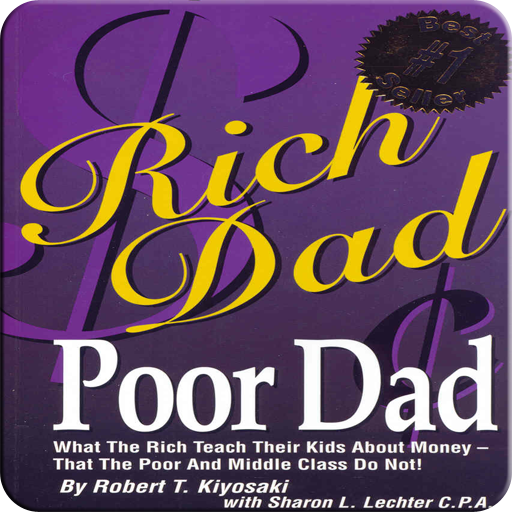“And how did you feel when Mrs. Martin dropped three dimes in your hand for three hours of work?”
“每次结束3小时的工作,马丁太太给你3个硬币,这时你又有什么感觉?”
“I felt like it wasn’t enough. It seemed like nothing. I was disappointed,” I said.
“我觉得钱不够。感觉就像什么也没得到似的,真让人失望。”
“And that is how most employees feel when they look at their paychecks—especially after all the tax and other deductions are taken out. At least you got 100 percent.”
“这也正是大多数雇员拿到工资单时的感觉,他们还要扣掉税和其他一些支出。至少,你拿到的还是100%的工资。”
“You mean most workers don’t get paid everything?” I asked with amazement. “Heavens no!” said rich dad. “The government always takes its share first.”
“你是说工人们拿到的不是全部的工资?”我吃惊地问。“当然不是,”富爸爸说,“政府要先拿走属于它的那份。”
“How do they do that?” I asked.
“它怎么拿呢?”

“Taxes,” said rich dad. “You’re taxed when you earn. You’re taxed when you spend. You’re taxed when you save. You’re taxed when you die.”
“通过税收,”富爸爸说,“你挣钱时得缴税,花钱时也得缴税。你存钱时得缴税,你死时还得缴税。”
“Why do people let the government do that to them?”
“政府怎么能这样?”
“The rich don’t,” said rich dad with a smile. “The poor and the middle class do. I’ll bet you that I earn more than your dad, yet he pays more in taxes.”
“富人就不会这样,”富爸爸微笑着说,“只有穷人和中产阶级是这样。我敢打赌我赚的比你爸爸多,但他缴的税比我多。”
“How can that be?” I asked. As a nine-year-old boy that made no sense to me.
“怎么可能呢?”我问道。作为一个9岁的男孩,是不会理解这些的。
“Why would someone let the government do that to them?”
“为什么有的人会让政府这么对待自己呢?”
I guessed he wanted me to learn instead of jabbering away in the mouth.
富爸爸坐在那儿沉默不语,我猜他希望我认真地听而不是说一些无聊的话。
Finally I calmed down. I knew my dad complained constantly paying so much in taxes, but really did nothing about it. Was life pushing him around?
于是我安静下来。我不喜欢刚才听到的事情。我知道爸爸总是抱怨税收太高了,但没有采取任何措施改变这种局面。生活是否也在推着他?
Rich dad rocked slowly and silently in his chair, just looking at me.
富爸爸缓慢而沉默地摇着座椅,看着我。
“Ready to learn?” he asked.
“真的准备好跟我学习了吗?”他问。
I nodded my head slowly.
我郑重地点了点头。
“Learning how to have money work for you is a lifetime study. Most people go to college for four years, and their education ends. I already know that my study of money will continue over my lifetime, simply because the more I find out, the more I find out I need to know. Most people never study the subject. They go to work, get their paycheck, balance their checkbooks, and that’s it. On top of that they wonder why they have money problems. Then they think that more money will solve the problem and few realize that it’s their lack of financial education that is the problem.”
“学习怎样让钱为你工作是一个持续终生的过程。大多数人上了4年大学后,学习也就到头了。可我知道我会用一辈子去研究钱这东西,因为我研究得越深,就越发现我还有更多的东西要学习。大多数人从不研究这个问题,他们去上班,挣工资,平衡收支,仅此而已,他们不明白自己为什么老缺钱,于是以为多挣点钱就能解决问题,但几乎没有人意识到缺乏财商教育才是问题的关键。”
“So my dad has tax problems because he doesn’t understand money?” I asked, confused.
“那我爸爸总为税头疼也是因为他不懂钱吗?”我疑惑地问。
“Look,” said rich dad, “taxes are just one small section on learning how to have money work for you. Today, I just wanted to find out if you still have the passion to learn about money. Most people don’t. They want to go to school, learn a profession, have fun at their work, and earn lots of money. One day they wake up with big money problems, and then they can’t stop working. That’s the price of only knowing how to work for money instead of studying how to have money work for you. So do you still have the passion to learn?” asked rich dad.
“税只是学习如何让钱为你工作的一个极小的部分。今天,我只想弄清楚你是否仍有热情去了解钱这东西。大多数人都没有这样的愿望,他们只想进学校,学习一门专业技能,然后轻松工作、挣大钱。到他们某一天醒来,发现已面临严重的财务问题时,他们已经不能停止工作了。这就是只知道为钱工作而不学习如何让钱为自己工作的代价。现在你还有热情学习吗?”富爸爸问。
I nodded my head.
我点了点头。












